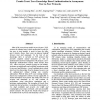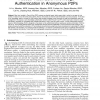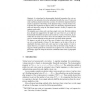62 search results - page 7 / 13 » A Dolev-Yao Model for Zero Knowledge |
IPPS
2007
IEEE
14 years 1 months ago
2007
IEEE
Most of the current trust models in peer-to-peer (P2P) systems are identity based, which means that in order for one peer to trust another, it needs to know the other peer’s ide...
TPDS
2008
13 years 7 months ago
2008
Most trust models in Peer-to-Peer (P2P) systems are identity based, which means that in order for one peer to trust another, it needs to know the other peer's identity. Hence,...
ACNS
2005
Springer
14 years 1 months ago
2005
Springer
Abstract. In voting based on homomorphic threshold encryption, the voter encrypts his vote and sends it in to the authorities that tally the votes. If voters can send in arbitrary ...
ICALP
2007
Springer
13 years 9 months ago
2007
Springer
Adaptive security, while more realistic as an adversarial model, is typically much harder to achieve compared to static security in cryptographic protocol design. Universal composi...
EMNLP
2009
13 years 5 months ago
2009
This paper proposes a probabilistic model for associative anaphora resolution in Japanese. Associative anaphora is a type of bridging anaphora, in which the anaphor and its antece...



